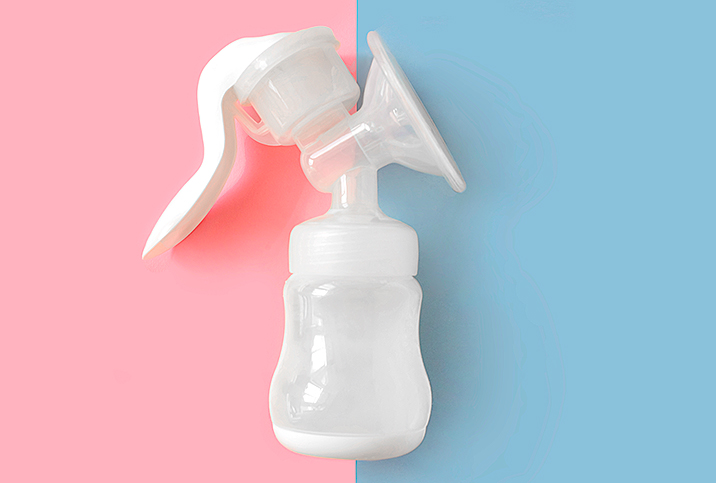When Your Baby Goes to the NICU: What Parents Wish They'd Known

There’s a lot to figure out when your new baby is admitted to the neonatal intensive care unit (NICU). It’s helpful to have a little insight into how things work, such as if you had planned to breastfeed or pump breast milk, how to use your support network and getting to know the specialists and available resources.
If you are beginning or anticipating a NICU journey, you don’t need to know it all. Focus on taking care of yourself and your family—and hopefully, find comfort in knowing that many professionals are paying attention to the things you haven’t thought to ask.
What if you had planned to breastfeed or pump breast milk?
Many NICU babies are not able to breastfeed, and if you want to breastfeed, you’ll have to pump instead. Healthcare facilities have lactation consultants on staff who can help you navigate everything you need to know about pumping breastmilk, storage and feeding your baby.
You’ll likely have access to a hospital-grade breast pump in the NICU. The lactation consultant can show you how to use it, where to access supplies such as bottles or stickers for labels and may offer advice on breast pumps for at-home use.
Lactation consultants and nurses in the NICU may point out helpful resources like free meal vouchers and pumping pods.
As things change for you and your baby throughout your stay, lactation consultants will be available to help you troubleshoot and make adjustments, like trying different sizes of phalanges and changing out your pump parts. Feel free to ask for help when you need it.
How can you best utilize your support network?
When a baby stays in the hospital, it’s often uncharted territory for loved ones who want to offer support. Sometimes people simply don’t know how to help.
Kate Schoof, Product Marketing Manager in Portland, Oregon, whose daughter spent one week in the NICU, suggested finding "someone on the outside to help you manage life and errands and whatever you need so when you’re there, so you can just relax and be present."
Schoof didn’t have cell service in their NICU room, so identifying someone who could handle things away from the hospital was crucial.
“It’s hard to know what you’ll need while you’re there,” said Schoof. “But some things include preemie diapers and clothing, or C-section or vaginal after-care items. Also, scent-free soap and detergent.”
Friends can get you stocked up on these things before you bring the baby home.
Other ways people can help while your baby is at the hospital include:
- Meal drop-offs
- Gift cards for meal delivery
- Taking the trash to the curb
- Light cleaning
- Interacting with family pets
Keep a list you can share with people when they ask. Friends and family appreciate knowing how to help.
Who is the NICU charge nurse and why is the nurse important?
Your nurses will likely become your greatest allies in caring for your baby. But the NICU Charge Nurse manages the whole department, so they have a bird’s eye view of what’s going on each day.
Ask the charge nurse whatever questions you have at the start of your stay, like where you’re allowed to eat and sleep and the rules regarding visitation, or if you have particular wants. The charge nurse role includes advising your nursing staff in the nursing unit about your requests.
Erin Schlozman, M.A., LPC, professional counselor with a focus on perinatal mental health and former NICU mom, wanted to care for her newborn baby however she could, “Tell the charge nurse: When I’m here, I want to do as much as possible,” and they’ll make sure all the nurses know.
Your NICU may allow you to request primary nurses, or assigned nurses. It may be comforting to know the same faces will see and interact with the sick or premature babies in their care. They will know all about your baby’s condition and find ways to help provide support.
Who are the specialists supporting my baby?
“The NICU is a terrible and magical place,” said Rachel Love, RN, in Portland, Oregon, whose daughter spent two months in the NICU. “And some of the sweetest magic stems from the special, largely unknown support that exists for families.”
The hospital staff might seem like a blur of white coats and colorful scrubs, but they have the clinical experience to help your baby thrive. You’ll learn the different specialties and departments too.
If you don’t connect with a particular staff member, ask for a swap. You may not be able to switch, but it doesn’t hurt to politely ask.
Some of your baby’s care staff could include:
- Neonatologist, or physician, to determine the right care plan for your baby.
- Physical therapist and occupational therapist to help your baby’s growing body.
- Social worker to provide physical, emotional and financial support.
- Case manager who organizes the resources your baby requires.
- Lactation specialist if you decide to breastfeed or pump milk for your baby.
- Specialty physicians, such as cardiologists, pulmonologists or surgeons.
Who are the specialists supporting me?
Babies are admitted to the NICU, but it affects the whole family. Your baby isn’t the only one with a team of helpers.
Sue Ludwig, President and Founder of the National Association of Neonatal Therapists, said parents might not be given information on all of these specialties and resources right away, because NICU staff realize this can be overwhelming.
"It’s hard to know when to provide parents with information, and how much," Ludwig said. But it’s available when you’re ready.
"A [NICU] social worker helped us navigate insurance choices, social security applications and provided individual therapy sessions," Love shared.
Specialists might be working when you’re not present. If you don’t see someone in social work or a therapist you’re looking for, talk to a nurse about how to connect with that specialist.
"Most therapists would be happy to adjust their schedule or connect with a parent over the phone," Ludwig said.
The NICU treats infants, but the NICU team is there for you, too.
The bottom line
When you have a baby in the NICU, life may look quite different from what you originally planned. If you feel overwhelmed, speak with the staff for help processing your emotions. The doctors and nurses in the NICU often have years of experience. They are there to help.


















